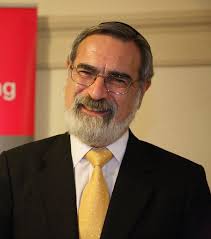Jonathan Sacks [1948-0] British    
Rank: 102
Clergyman, Rabbi
Jonathan Henry Sacks, Baron Sacks is a British rabbi, philosopher and scholar of Judaism.
He served as the Chief Rabbi of the United Hebrew Congregations of the Commonwealth from 1991 to 2013. Religion, Space, Education, Faith, Family, Fear, Society, Technology, Trust, Alone, Beauty, Best, Courage, Dreams, Food, Forgiveness, Freedom, Future, Health, Imagination, Leadership, Life, Politics, Power, Respect, Science, Teacher |  |